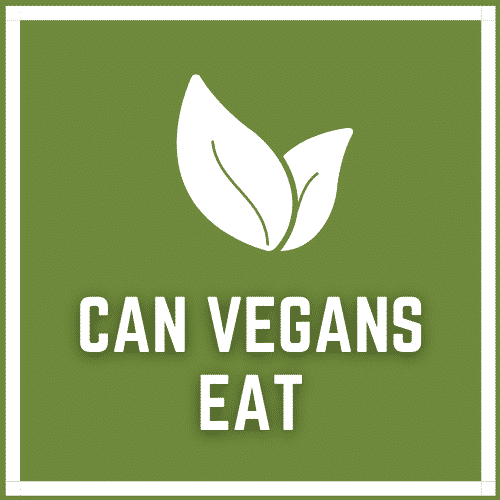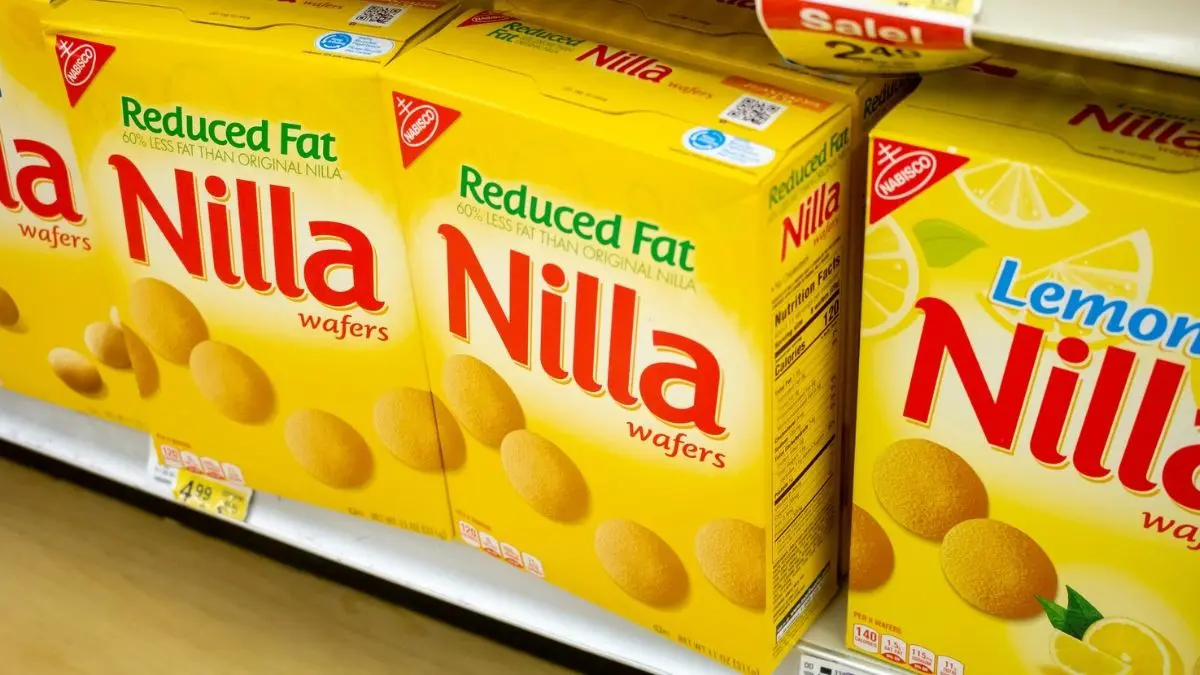Answer: No.

Table of Contents
Are Nilla Wafers Vegan?
You might’ve wondered if Nilla wafers are vegan.
Nilla wafers are, unfortunately, not vegan. They contain various non-vegan ingredients.
Vanilla is often known as a dull and ordinary flavor. However, the chances are you love vanilla and don’t even know it. Vanilla ice cream is one of the most favorite flavors in America.
Nilla wafers are round and thin wafer cookies that are vanilla flavored. Although the chocolate chip is one of the most loved cookie flavors, the Nilla wafers top the famous wafer list. This all points towards the fact that you probably have a weakness for Nabisco’s Nilla vanilla-flavored wafers.
If you’re looking for vegan alternatives to your favorite snack, we’ve got you covered!
Why Are Nilla Wafers and Vanilla Wafers Non-vegan?
Vanilla wafers were a staple snack in most American households in the 19th century. The recipe, created by Gustav A. Mayer, was later sold to the National Biscuit Company (Nabisco). Nabisco was the result of the acquisition of several bakeries.
The original name of Nilla wafers was ‘Nabisco Vanilla Wafers.’ They changed the name to Nilla wafers in 1967. It is a natural question to wonder why these biscuits are called wafers. A wafer is a ’small sweet cake’ or a ‘thin crisp cookie.’
Nabisco Nilla Wafers constitute the following ingredients:
- Unbleached enriched flour (wheat flour, reduced iron, riboflavin, niacin, thiamine mononitrate, and folic acid)
- Leavening (baking soda, calcium phosphate)
- Vanilla extract
- Natural flavor
- Artificial flavor
- Canola oil
- Eggs
- Emulsifiers (soy lecithin, vegetable monoglycerides, datem)
- High fructose corn syrup
- Palm oil
- Salt
- Sugar
- Whey (from milk)
Milk (All Variants)
Milk is a common ingredient in most snacks. It is almost impossible to escape the use of milk in snacks. Milk is also consumed as a drink and has the nutrients necessary for good health. It is also available in yogurt, cakes, puddings, caramel, treats, and pies.
Due to the glaring presence of dairy, Nilla wafers are not vegan. Some wafers use ‘spread,’ a by-product of milk. Spread is rich in fat content, and has good umami and flavor. Food containing margarine is also dairy-based.
There are also milk proteins that are available in snacks. The most basic milk ingredient in Nilla wafers is whey protein, nearly 20% of the protein in milk. Whey protein is not available in plants and is not vegan.
Milk is essential to balance the fixings, enhance texture, and help increase nutritional value. The various fixings used in desserts and snacks are cane sugar, egg whites, rice flour, potato and pea starch, water, and vanilla extract.
Whey Protein
Milk has two proteins in it – whey and casein. Whey protein can be isolated from milk when making cheese or baking. It also consists of all the necessary amino acids and is low in lactose.
The most popular source of whey protein is often protein powders. They are beneficial in helping muscle development, weight loss, and reducing cholesterol. Scientists are constantly updating the benefits of whey, so this list isn’t exhaustive.
Benefits
- Helps in losing weight: The consumption of whey protein helps lose body fat and develop lean muscle compared to people who don’t consume it.
- Helps lower cholesterol: People who consume products with whey protein showed low cholesterol and LDL levels over three months.
- Helps fight asthma: A study in the International Journal of Food Science and Nutrition showed that regular consumption of whey protein increases immunity.
Dangers
- Allergens: People allergic to milk and its components (lactase, lactose, and whey) can have side effects if consumed. However, the side effects are not severe if the intake is moderate. Excessive consumption can cause:
- Acne
- Cramps
- Fatigue
- Headache
- Nausea
- Reduced appetite
- Stomach aches
- Excessive protein: High intake of whey increases oxidative stress, and liver toxicity and may lead to kidney disease due to the amount of protein present.
Vegan Alternatives to Milk
If you’re whipping up a batch of Nilla wafers and are worried about what to use in place of whole milk, there are plant-based alternatives you can try. The most popular options are soy milk, almond milk, rice milk, coconut milk, and oat milk.
Egg (Generic Vanilla Wafers)
Egg whites are part of most vanilla wafers. They are the second most used fixings in snacks and desserts by weight. Eggs are versatile ingredients as they help add flavor, raise flour, emulsify, settle, thicken, and tie the various components of the food together.
They are used to prepare bites, courses, and prepared meats due to their varied uses. Some snacks do not use eggs, like Oreos. However, they do pop up when you’re trying to filter vegan food.
Benefits
- Low in calories: An egg white has 17 calories. A whole cup of egg whites has 126 calories. If you’re trying to reduce caloric intake, this is a great idea.
- High in protein: Egg whites are fat-free and rich in proteins. Proteins in egg whites are highly beneficial in muscle development and skin nourishment. If you want more protein in your diet, adding 3-4 egg whites can help you.
Dangers
- Low in vitamins: While rich in proteins, egg whites are not a significant source of vitamins. Egg whites lack Vitamin B, Vitamin B-12, and Vitamin A, all of which are crucial for the effective functioning of the body.
- Low in minerals: Egg whites also lack the minerals, iron, and selenium, which you need for thyroid function, production of energy, muscle development, and oxygen support.
Vegan Alternatives to Eggs
There are simple ways to replace eggs in a dessert. The most popular options are apple sauce, aquafaba, ripe bananas, tofu, and tapioca starch.
Natural Flavor
You can get natural flavors from plants or animals, which is the cause of the issue. While most products will only use plant-based ingredients, there is a slight chance of cross-contamination or the addition of animal-based derivatives.
An example of this is ginger ale. Some variations of ginger ale have honey, which is not a vegan product. There is an obligation for companies selling these products to reveal their ingredients. Therefore, consumers have the right to call and ask the manufacturers or google it.
While there are no alternatives to natural flavors, you can always make your batch of food and read the label twice before investing in an all-natural brand.
Refined Sugar
While sugar is a vegan product, refined sugar is not necessarily so. There are brands in the US that use bone char to decolorize sugar. The use of bone char is an issue because it is well-hidden, and companies do not admit to using it.
Bone char is acquired from cattle and used as a decolorizing and deashing agent. Companies use bone char to remove inorganic and unnecessary ingredients, like salt. That’s how refined sugar ends up in your pantry.
Alternatives to Refined Sugar
You can use refined sugar alternatives to ensure your diet is vegan and reduce excessive consumption of sugar. Consumption of sugar excessively can lead to adverse health issues.
Excessive sugar consumption, including added sugars, can lead to cardiovascular disease, metabolic syndrome, obesity, poor oral health, and type 2 diabetes.
Simple alternatives for refined sugar are natural sweeteners, stevia, xylitol, and artificial sweeteners. Some artificial sweeteners to use are sucralose, saccharin, neotame, acesulfame potassium, and aspartame.
Artificial Flavors
Scientists make artificial flavors in labs and, as a result, are considered vegan-friendly. Artificial colors are considered non-vegan by a few vegans due to animal testing. Animal testing is deemed to be unethical, and therefore the products that use it are too.
The central aspect to keep in mind when consuming products with artificial ingredients is the frequency of testing.
Alternatives to Artificial Flavors
While it can be hard to substitute the flavoring itself, there are a few natural ingredients that you can use in place of artificial flavoring. If you’re looking at refined sugar, you can use maple syrup, agave, coconut sugar, beet sugar, and stevia.
For other flavors like fruits and spices, you can use the fruits, herbs, spices, and their extracts to get as much taste as you need. It might be challenging to start with, but you will appreciate ‘natural’ flavors a lot more once you do.
Vegan Alternatives to Nilla Wafers
While the Nilla Wafers aren’t vegan, there are a few vegan options available!
- 7-Eleven Fudge Mint Cookies.
- Back to Nature Vegan Vanilla Wafers
- Lemonades (Girl Scout Cookie)
- Manner Hazelnut Waffles
- Manner Lemon Cream Wafers
- Nutter Butter Bites
- Oreos
- Peanut Butter Patties (Girl Scout Cookie)
- Thanks-A-Lot (Girl Scout Cookie)
- Thin Mints (Girl Scout Cookie)
Summing Up
When making your traditional Southern banana pudding, Nabisco Nilla wafers might be at the top of your shopping list. Nilla wafers are also a great cookie to have with milk. The Nilla brand is very simple, and as a result, you might even think it’s healthy.
However, the ingredients indicate the opposite. Besides being non-vegan, the ingredients can cause detrimental side effects if not taken in moderation.
We hope you can enjoy a delicious vegan vanilla-flavored snack with the vegan ingredient substitutes and alternatives we have provided!

